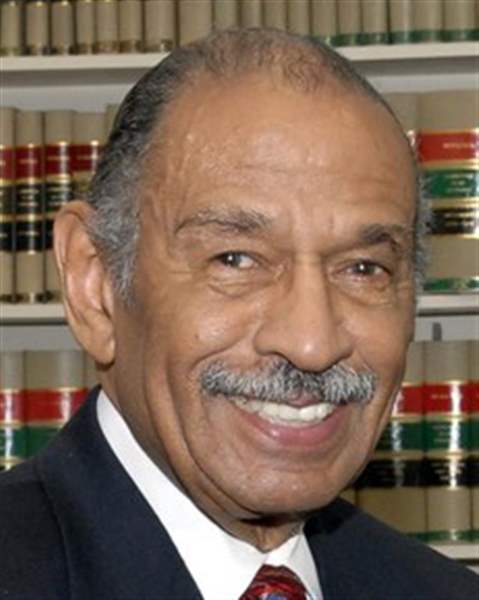
COMMENTARY
Is this the beginning of the end for Michigan's Conyers?
7/20/2012
John Conyers
DEARBORN HEIGHTS, Mich. -- On the day Lyndon Johnson crushed Barry Goldwater in the 1964 presidential election, the nation's last liberal landside, John Conyers was elected to the U.S. House.
This year, the nation's second longest-serving member of Congress is counting on winning yet another term. (The longest-serving congressman? Mr. Conyers' legislative neighbor, Rep. John Dingell, a Democrat from Dearborn, Mich.) Most expect Mr. Conyers to do so.

John Conyers
But Michigan's 13th U.S. House District has changed, Mr. Conyers has changed, and two black longtime lawmakers are challenging the elderly representative in the Aug. 7 Democratic primary. If state Sen. Bert Johnson, state Rep. Shanelle Jackson, or both collect a significant number of votes, it's not hard to imagine a fourth candidate, state Sen. Glenn Anderson of Westland, scoring a huge upset.
The math is compelling. Perhaps 55 percent of the district's residents are African-American, but patterns indicate as many white voters as black ones are apt to show up at the polls next month. The district is so Democratic, the primary winner virtually is assured of victory in November.
There is another white candidate, Westland councilman John Goci, but he has little money or name recognition. Mr. Anderson has both. His generally liberal record and longtime NAACP membership may make him acceptable to some black voters.
Once, the thought of anybody beating Mr. Conyers on his home turf would have been unthinkable. But the nation is hardly the same place that sent a young firebrand black lawyer to Washington in 1964.

Michigan State Sen. Glenn Anderson
Mr. Conyers remains in Congress, yet more and more voters wonder not only how effective he is, but also, to put it charitably, to what extent the 83-year-old is aware of what is going on.
Last fall, during a commemoration of the Sept. 11, 2001, attacks, he urged bewildered Arab-Americans in Dearborn to pay more attention to jazz musicians Miles Davis and John Coltrane. His prestige also took a hit when his wife, Monica Conyers, went to federal prison for conspiring to commit bribery.
The last major effort to defeat him came in 1994. Melvin "Butch" Hollowell, who then seemed to be a rising political star, ran an aggressive campaign with the support of Detroit's newspapers. But Mr. Conyers beat him by a margin of almost 2-to-1.
That was when the district was nearly all African-American. Today, Mr. Conyers is running in a newly configured 13th District, though he doesn't live there.
Slightly over half the district is in Detroit. The rest is a collection of mainly white, blue-collar suburbs, including Westland, Garden City, and Dearborn Heights.
Mr. Anderson, 58, has represented the western half of the district in the Michigan Senate for nearly six years. Cheerful and hard-working, the Tennessee native arrived in Westland in 1969 at age 15.
After he finished high school, Mr. Anderson, like many Detroiters before him, got a job on the line at what the workers call "Ford's." He worked there for more than two decades, eventually becoming a Realtor on the side.
He fell in love with politics thanks to Robert Kennedy's 1968 presidential campaign. Today, he says his heroes are "Bobby Kennedy and Barack Obama."
He took classes at Wayne State University, but never graduated. In 1991, he ran for Westland's city council, and won.
Nine years later, he was elected to the first of three terms in the Michigan Legislature. "I put my real estate business on hold," Mr. Anderson said. "I felt we owed it to the taxpayers to live on what they paid us," now about $71,000 a year.
Six years ago, he challenged incumbent GOP state Sen. Laura Toy. "Everyone told me that was a mistake," Mr. Anderson said. "But I won."
He remains the only Democrat to beat an incumbent Republican senator in Michigan in decades. He ran for re-election during the Republican landslide of 2010, yet increased his winning margin.
Mr. Anderson thinks he can pull another upset this time. He is careful to speak respectfully of the incumbent: "I wish he would have chosen to retire with dignity." Mr. Anderson adds that he hasn't seen Mr. Conyers "doing much for Detroit or the suburbs" in recent years.
The Detroit Free Press agreed with him about that, but supported Mr. Conyers on July 16 with a bizarre endorsement. Noting that Mr. Conyers' "energy and effectiveness are clearly on a downward slope," Editorial page editor Stephen Henderson added that "this probably needs to be the last time around."
The endorsement left readers scratching their heads. Although the newspaper praised Mr. Anderson for "great constituent services," it faulted him for "struggling to be a productive lawmaker in Lansing."
That struck Travis Gonyou, manager of the Anderson campaign, as absurd. "Struggling? Republicans have a super-majority," Mr. Gonyou said. "It's hard for Democrats to get anything at all done."
Some observers speculated that the endorsement was motivated by the feeling that the paper couldn't end up not endorsing a black candidate for Congress.
The Anderson campaign had better news this week. Campaign finance reports showed Mr. Anderson to be almost even in cash on hand. The figures: Mr. Conyers, $141,900; Mr. Anderson, $136,820. Senator Johnson had only $3,457. The other candidates had virtually nothing.
Mr. Anderson said that if he wins, he hopes to bring jobs and educational opportunities to the district.
"All I can do is hope people look at my career and what I have done," he said. "If they do, I think we'll be OK."
Jack Lessenberry, a member of the journalism faculty at Wayne State University in Detroit and The Blade's ombudsman, writes on issues and people in Michigan.
Contact him at: omblade@aol.com